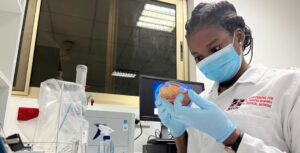Study in Bangladesh shows zinc is an essential element in male fertility
Trace levels of zinc present in semen is a vital determinant of male fertility, a recent study in Bangladesh capital Dhaka concludes.
The study titled, ‘Impact of Seminal Plasma Zinc and Serum Zinc Level on Semen Parameter of Fertile and Infertile Males,’ was done at the Center for Assisted Reproduction, a tertiary infertility center and at the Biochemistry Department of Bangabandhu Sheikh Mujib Medical University (BSMMU).
A total of 16 fertile males were taken as control and 69 infertile males were taken as cases in the study. Serum zinc and seminal plasma zinc levels were measured for analysis.
Explaining the analysis Professor Parveen Fatima, the lead author of the study, says, “In the group of fertile men, we found serum (blood) zinc level lower than for the infertile group, whereas the seminal plasma (fluid) zinc level was higher in the fertile than the infertile group which was not statistically significant.”
Zinc is an essential trace element required for normal production of sperm cells and steroid like sex hormones – testosterone. Its deficiency is one of factors responsible for decreased testicular (male reproductive organs) function in infertile males.
Professor Fatima explains, “Higher seminal plasma zinc concentration has positive correlation with sperm count, motility and serum testosterone (sex hormone) levels having most important effect on sperm motility. It helps in stiffening of outer dense fibers by formation of disulfide bridges or strong bonding protein molecules during sperm maturation, which is an essential step for generation of sperm motility; especially progressive motility as shown in the study.”
Zinc deficiency affects sperm production, maturation and motility, as well as fertilizing capacity of the active matured sperm cells.
The high level of zinc found in semen is primarily due to secretions of the prostate, the study notes.
Zinc contributes to fertility through its significant effects on various semen parameters. Zinc in seminal plasma stabilizes the cell membrane and nuclear chromatin or accumulation of complex proteins that contain coded functions of life of the sperm cells.
In the fertile group, all parameters showed positive relationship; and in the infertile, except sperm morphology, all other parameters showed negative relationship. In the fertile group, only semen motility showed a statistically significant relationship but none in infertile group.
The human body contains approximately two grams of zinc in total. The daily requirement of zinc per day is 10 micrograms for adult women and 12 mg for adult men.
The World Health Organization (WHO) estimates that zinc deficiency affects one-third of the world’s population (about two billion people) with the prevalence rates ranging from four to 73% in various regions.
The study concludes that zinc may contribute to fertility through its significant effects on various semen parameters. It appears that the estimation of seminal plasma zinc may help in investigation and treatment of infertile males.
The study, was published in Journal of Bangladesh College of Physicians and Surgeons, is hosted on the INASP-supported Bangladesh Journals Online (BanglaJOL) platform.
For more information: Journal of Bangladesh College of Physicians and Surgeons, Professor Fatima Parveen, Dr Dilruba Rahman, Dr Chowdhury Rashedul Mugni, Impact of Seminal Plasma Zinc and Serum Zinc Level on Semen Parameter of Fertile and Infertile Males, Volume-35, No. 01 January 2017, Pages 15-19. The journal and the article are made available online on the BanglaJOL platform, which is supported by INASP.
About the Journal
Journal of Bangladesh College of Physicians and Surgeons is published by Journal of Bangladesh College of Physicians and Surgeons.
About BanglaJOL
BanglaJOL is a database of journals published in Bangladesh. It was initiated in June 2007 and officially launched in September 2007 with the support of by International Network for the Availability of Scientific Publication (INASP). The objective of BanglaJOL is to give greater visibility to the participating journals, and to the research they convey. It is managed locally by the Bangladesh Academy of Science (BAS). It provides open access to the full text of research articles published in 141 different journals from a wide range of academic disciplines and genres.
About INASP
Founded in 1992, INASP is an international development organization working with a global network of partners in Africa, Latin America and Asia. In line with the vision of research and knowledge at the heart of development, INASP works to support individuals and institutions to produce, share and use research and knowledge, which can transform lives.
INASP’s approaches are based on the core pillars of capacity development, convening, influencing and working in partnership. INASP promotes equity by actively addressing the needs of both men and women across all our work and addressing issues of power within the research and knowledge system. INASP has projects in 28 countries, supporting all aspects of research and knowledge systems, from facilitating the provision of information to researchers to helping parliamentarians and civil servants to use research and evidence in policy making.
Disclaimer: Research published in journals hosted on the BanglaJOL platform is selected by the journals in accordance with their own editorial processes and criteria. INASP and BanglaJOL provide hosting and guidance on good practices but are not involved in selection of research.
For Further Information
Naimul Haq, Communications Consultant, INASP
Email: NHaq@inasp.info
Dr Sangita Shrestha, Communications Officer, INASP
email: sshrestha@inasp.info

 Previous Post
Previous Post


